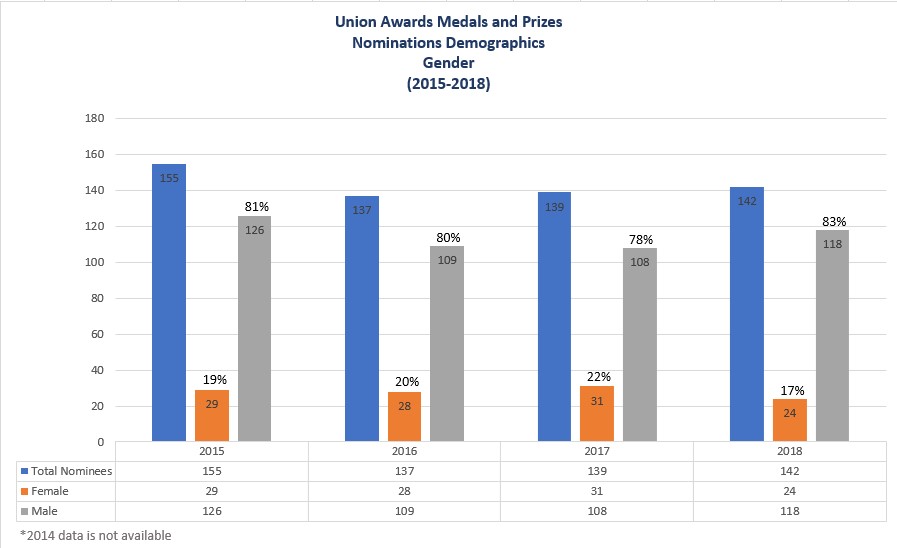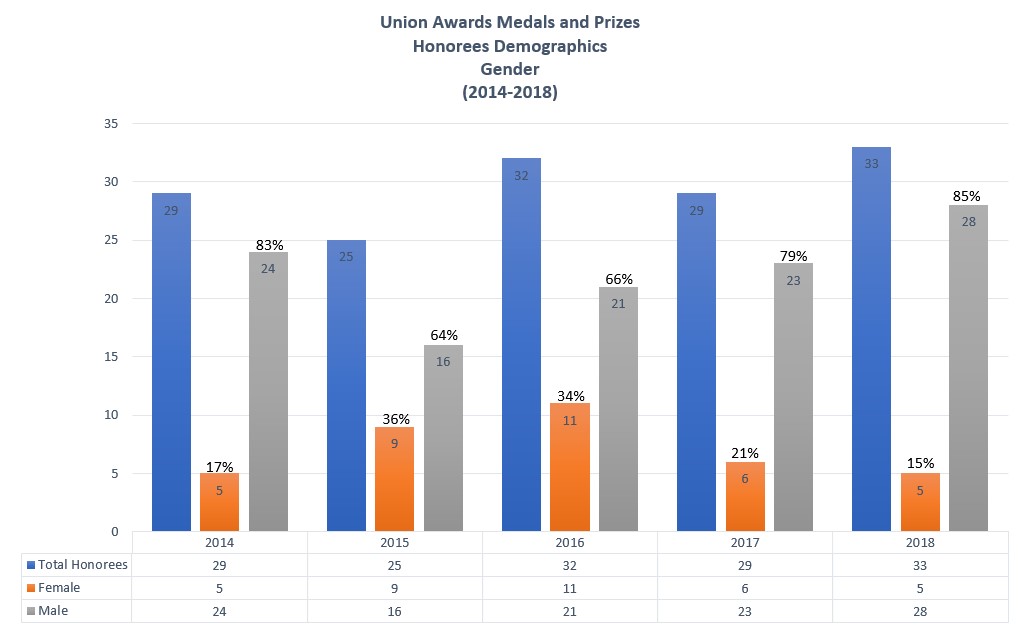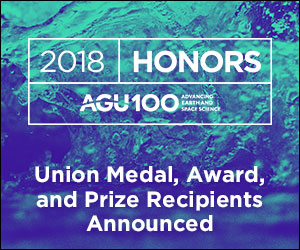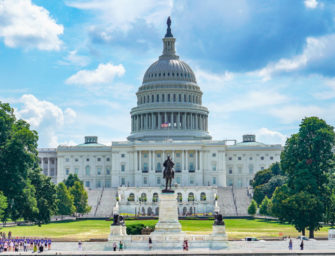How Will We Address the Lack of Gender Diversity in AGU Medals, Awards and Prizes?
Earlier this week, we proudly announced the recipients of the 2018 Union Medals, Awards and Prizes. These distinguished individuals are recognized for the excellence and impact of their work, and for exemplifying AGU’s mission to promote discovery in Earth and space science for the benefit of humanity. However, a demographic analysis of AGU’s most prestigious honorees reveals that women are under-represented when controlling for career stage and other factors.
Over the past few years, volunteers who lead our Honors & Recognition efforts have endeavored to move the needle, and they have succeeded in the case of AGU Fellows, where women were elected this year proportionate to their numbers in the membership at the related career stage. Strides have also been made to improve recognition of our international colleagues. But inequity in honors remains. The high-level trend data below on nominations and honors awarded tells part of the story, and make it clear that it is time for an even more concerted and community wide effort to address this issue.


Many of our honors statistics can be found here: https://honors.agu.org/diversity-resources/. For context, 20% of PhDs in Earth, atmospheric and ocean sciences in the U.S. in 1995 (which we use as a tentative benchmark for the cohort now being recognized with honors) went to women. More research on this topic is needed.
Women are not being nominated in sufficient numbers across most award categories. The Council Leadership Team noted in a recent review of honors that women were particularly underrepresented in the medal category; six of the 13 medals in 2018 did not receive a single female nominee.
While there was a paucity of nominations of women this year for Union medals, many factors are influencing the results, including implicit bias throughout the process and undue reliance on existing networks. Research demonstrates that there is a persistent tendency for both men and women to undervalue women’s professional contributions, so they are less-often asked to be invited speakers, given less credit for ideas, and less-often nominated for honors. And yet, recent data from our own publications shows that papers submitted to AGU journals with a woman as first author have a higher acceptance rate. Our community is not properly recognizing the great work women do in the same way that we notice the great work of men.
So, what can we do?
Our Honors & Recognition Committee has several plans in motion:
- Expand the pool of nominations: A canvassing committee will be launched in 2019 that will draw on Section representatives and at-large members, some of whom will represent specific populations of the AGU community. The job of the new committee will be to broaden networks, identify individuals who are overdue for an AGU award, and recruit and expand the pool of nominators. This approach has already been used successfully by several Sections for their Fellows nominations and for their Section awards, with clear results of increasing nominations of women. We should be encouraged by these results and apply what has been learned from this work to all of our Union level honors.
- Address implicit bias in the process: In 2019 implicit bias training will become part of the selection committee process.
- Improve the overall process: Process improvements and standards – including procedures, a best practice guide and rubrics – are in development to provide improved guidance to selection committees. Further, the Honors & Recognition Committee has made strides in diversifying the selection committees in terms of gender, career stage, geography, and discipline, and that will continue.
- Develop data-Informed objectives: A good deal of analysis of data has been done by the Honors & Recognition Committee and staff, but more work remains. We need to look more deeply at the data we have and develop an approach for setting targets for awardees based on demographics.
We applaud the Honors & Recognition Committee’s work to date and their plan going forward, and we believe they will make a difference. But we cannot expect our honors committees – on their own – to shift the culture of our Earth and space science community. Nor is the solution one that should rest on the shoulders of women scientists alone. As your president and president-elect, we are committed to addressing and overcoming the underlying causes of gender inequity in honors and recognition. These awards, medals and prizes belong to our community: we must embrace this challenge together to ensure that all contributors are valued equally.
One step many of us can take for the next honors cycle is to nominate a woman you admire, who you think should be walking across the Honors Ceremony stage in 2019 – as we celebrate AGU’s Centennial. We encourage you to attend the workshop on how to put together a successful nomination package that will take place at Fall Meeting 2018 – or if you miss that – check out the online guidelines.
Another step you can take to help AGU ensure the awards process is fair is to identify your gender and race/ethnicity when you renew your membership so that we have better information on our demographics. The data are used only in the aggregate to determine the percentage of different groups who are AGU members. Personal data are never shared.
Five years from now, as the leaders and members of AGU view the trend data, we would like to see that 2019 marked a turning point. While we have made progress in some areas, we are redoubling our efforts. What else should AGU do to achieve that result? What can you or your institution or organization do? We invite your ideas and recommendations. Please share your ideas here for all to see, or, if you prefer, write us privately at [email protected] and [email protected].




Thank you for such an informative presentation. As a Geological Society of America Fellow, I recently serve on a committee to provide scholarships for field camp, and based on applications submitted–gender diversity is more than just male/female. We who are older must expand our awareness of how important full gender representation is to the younger generation, whom we hope will continue the legacy of earth science professional recognition.
Hopefully these should see improvements in terms of divsersity being recognised. But why omit LGBTQ people from being counted as well when renewing membership? For the AGU to be fully inclusive & recognise diversity across the board, LGBTQ must not be forgotten
I really like the efforts AGU is taking to address the gender bias issues. I have two specific suggestions for consideration, specifically for expanding the pool of nominations:
1. A special request be made to this year’s awardees that they each write one nomination letter for a woman.
2. Women are asked to self nominate themselves to create a pool of possible women to nominate. This list is made available to technical committees, and maybe even AGU members to write nomination letters.
Please allow women to self-nominate! I’m a young scientist who saw the announcements for awards and thought, gee, one of my recent papers got a lot of traction, maybe this is something I could be eligible for. I didn’t have the audacity to ask anybody. If I could have self-nominated, and then had a colleague/advisor/mentor add a follow on nomination, maybe the situation would be different. (And also, what scientist really can’t find one person to vouch for them? It’s almost so trivial of an exercise that I argue it kind of loses merit.)
I think also individual departments could be taking this on internally (though probably won’t)- in a business settings, these nominations would fall under corporate PR’s responsibility.
It’s great to see these data – and its clear that a major problem is with the nomination process, since nominated women win at approximately equal or higher rates than nominated men. I’d like to see efforts principally focused on broadening the pool. But I’d also like to see discussion of other aspects of diversity within our profession. Even we are doing poorly for women, we are surely doing even worse for people of color, those with (dis)ability, LGBTQ people, and non-binary people. In discussions – and actions – on diversity, let’s broaden the scope.
If, as the article states, a high manuscript acceptance rate is a proxy for merit, perhaps a portion of the nominations could come from a data analysis exercise rather than traditional networks. This analysis might highlight those who are doing exceptional work, but who are part of less-traditional networks. The analysis might include the number or percentage of manuscripts accepted at AGU journals, the citations of those articles, the percentage of student manuscripts accepted at AGU journals, or other factors as appropriate.
Thanks for the feedback. AGU has made progress on the Fellow nomination process so the awardee’s reflect the AGU population. Next step all honors. The Honors and Recognition Committee is going to take a close look at all these ideas. We clearly need to increase the pool of nominations across the board and check for implicit bias in our process. Keep your ideas coming and Honor and Recognition and the Council will discuss how to improve things in the coming months. Aiming for a diverse class of awardees next year.
You could also give women extra time in a given career stage. For instance, in calculating career stage for European Union grants, women are given an extra 18 months for every child that they have had. The idea is that even if the woman returns to work, she still typically takes on more childcare responsibilities, and needs more time for career development.
I like that AGU is making this effort. AGU could also give women additional time for a given career stage. For instance, when calculating career stage for European Union grants, women are given an additional 18 months for each child they have had. The idea is that even if women return to work, they typically take on more of the childcare responsibilities, and therefore need more time for career development.
It is great to see the data on the awards and nominations. I believe that it is important that ALL members of AGU take ownership of this challenge. Putting together a successful nomination is quite a bit of work and requires and significant investment of time. While I understand the sentiment of allowing women to self-nominate and asking women to nominate women, and I’m not necessarily opposed to these things, I think everyone needs to see this as an important problem and ask themselves, “is there something I can do?” Why can’t men nominate women? I know I’m asking myself who should I nominate.